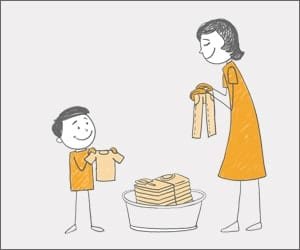Parents, did you know, there’s a new disease doing the rounds in children called Infobesity?
Yes, infobesity exists and can have a pretty dangerous effect on your child.
But what is it?
And how do you prevent your child from falling prey to it?

We’ll tell you!
Infobesity is basically ‘information obesity’ — it’s what happens when your child receives too much information and doesn’t know how to deal with it.
Just take a second to think about this…
What happens when you feed in a fat load of information to a digital device?
It makes our phone hang…
And slows down our computers…
Now, if gadgets/devices can’t handle it, imagine the impact it can have on the human brain!
We have a psychologist, learning, and development expert Vidya Ragu talking to us here about this particular phenomenon, and the adverse effects it can have on the lives of our children.
She also shares how we can curb these effects to a great extent.
So what really is infobesity?
In this digital age, both children and adults alike face this problem due to an overload of information from various technological sources.
In fact, research shows that at any given point in time, every individual absorbs about 34 GB of data from their surrounding environment.

This overload of information leads to Infobesity.
In the same way that parents are often concerned about their child becoming obese by accumulating fat and not exercising, they have reason to be concerned about the overload of information received by their kids as well.
 Jhilmil Bhansali from mommyinme says, “As our elders used to say, excess of everything is bad and so is the case with loads of information today. At times, kids are flushed with many wrong facts as well, which never help them enhance their knowledge base. Children have started lacking that Information ‘processing’.”
Jhilmil Bhansali from mommyinme says, “As our elders used to say, excess of everything is bad and so is the case with loads of information today. At times, kids are flushed with many wrong facts as well, which never help them enhance their knowledge base. Children have started lacking that Information ‘processing’.”
Our children have infinite access to gadgets, be it household gadgets or the devices of adults.
 Says Prerna Sinha from maaofallblogs, “Our lives and times were simple. If we needed some information we headed to the library and referred to books our teachers and friends recommended and it was after reading a few that we collated information. Today, even before asking their teachers or their parents the kids press Google and we all know the numerous amount of sites that open up when we do that. As parents, we should encourage our kids to pick up dictionaries all the time and head to the library at least once in a while.”
Says Prerna Sinha from maaofallblogs, “Our lives and times were simple. If we needed some information we headed to the library and referred to books our teachers and friends recommended and it was after reading a few that we collated information. Today, even before asking their teachers or their parents the kids press Google and we all know the numerous amount of sites that open up when we do that. As parents, we should encourage our kids to pick up dictionaries all the time and head to the library at least once in a while.”
They’re basically digital babies.
RELATED: Quick & Easy Ways To Reduce Your Child’s Time On TV/Mobile Phones >
They’re exposed to a very high amount of data on any given day.
If your kid accumulates information that he or she doesn’t require or prioritise accordingly, it results in infobesity.
What are the effects of infobesity?
-
Behavioural Changes
In children, the most obvious changes that occur are usually behavioural. They tend to become more aggressive, fragile and irritable.
These emotional changes occur due to the child’s inability to prioritise the different emotions they feel about the different streams of information pouring in.
They may also face an exaggerated amount of fatigue and tiredness exactly like adults do, due to the information overload. This can, in turn, make them irritable.

-
Prioritising Irrelevant Information
Children tend to lose attention and focus from what really matters and often don’t differentiate between what does matter and what doesn’t.
When children are taking in information from schools and books, the information is usually relevant and productive.
They are simultaneously absorbing information from gadgets in the form of games, internet web pages, the television, etc, as they’re more entertained by information in this form than the relevant information they’re learning, they tend to prioritise the irrelevant information.
This could be one of the main reasons your child is brilliant with computers and gadgets but can’t seem to retain much from school.
-
Bad Decisions Are Made
What this also results in, is that we often end up making bad decisions. If children, especially, lose sight of what’s important, they make decisions based on unimportant factors.
An example of this would be, your child or teenager being easily influenced by tabloids and the social media portrayals of their friends’ lives and even celebrities’ lives, and doing anything they can to follow their footsteps.
They forget to think about how that’s merely a portrayal and often untrue of their reality, and simply want to be that way. This can include the result of a false body image and choose to look good over being healthy which is what really matters.
How To Prevent Infobesity In Children:
i) Teach Your Child To Prioritise Information
 For our children, we need to create an environment in which they realise that they don’t need to retain all the information that they absorb.
For our children, we need to create an environment in which they realise that they don’t need to retain all the information that they absorb.
We need to teach them how to process the information they’re absorbing in certain ways, based on how they prioritise them.
So step one would be, teach them to prioritise the information they receive and classify them as important and unimportant.
Teach them about how certain types of information help you get where you want to go, such as gaining relevant knowledge and acquiring important skills. This results in better problem-solving abilities and hence a better future.
But other kinds of information don’t contribute to our lives in meaningful ways at all. An example would be gossiping about the lives of others instead of focusing on our own.
ii) Focus On The Relevant Information
Children absorb almost any information they’re exposed to. Having a conversation with your child about what information it is important for them to use, is essential.
Step two would be to talk to your child specifically about the things you want them to learn and remember. This would be the information you want them to explicitly focus on.
This would help your child ignore the clutter of other information that they don’t need. Decide what you want your child to learn and stress on that.
Examples of the important information you want your child to remember could be anything from encouraging them to read stories or non-fiction based on any topic that they find interesting, to enrolling them in a class for a skill they want to learn.
RELATED: 13 Mind-Blowing Tips To Increase Your Child’s Concentration Skills >
iii) Limit Screen Time
 We can also encourage research through books in libraries instead of always using the Internet, and we need to work on limiting screen time for our children.
We can also encourage research through books in libraries instead of always using the Internet, and we need to work on limiting screen time for our children.
This would give them room to absorb information from sources other than digital ones which is often a lot more relevant and important.
When it comes to limiting screen time, research Ms. Brewer, suggests that we focus on the three M’s — Mindful, Moderate, and Meaningful use of technology.
We need to make sure both us adults and children assess how they feel before using the Internet or any other form of screens, why they’re going to use it, and decide what they’re specifically looking for.
We also need to understand how using the device is affecting our state of being while we’re using it.
Once we do this, we can work on deciding beforehand for how long we’re going to be on the device for. We can then examine how using the device is contributing to our goals and overall well-being.
PRO TIP: A great way to engage your child without the use of screens is an activity box like Flintobox! These activities are designed to teach children in a step-by-step information, where they learn and process information through play. It’s a steady approach and children are introduced to a variety of concepts over a period of time. For more information on Flintobox activities, visit this link >
iv) Give Their Brain Time To Process Information
If this processing doesn’t take place, the result is quite similar to what happens when we accumulate fat in our body and don’t exercise to burn it off.
We need to connect with people and share the information we’ve accumulated, obviously only focusing on the relevant information. This would help make it meaningful as well.
Aside from connecting, self-reflection on all the information is extremely important, too.
Understand the information you use and only prioritise the information you can and need to use – this is what we essentially need to teach our children.
We need to teach them to build a structure around the information they receive and we also need to teach them to effectively express the information in one way or another.
We can urge them to express this by drawing, by talking about it, or even through more creative means such as asking them to do a role play on the information to try and pass it on.
You can also ask them to make a model of sorts to display any information they’ve learned that they find interesting.
This is essentially encouraging them to talk and express anything they read about or hear about, and it’s often easy to tell what information has captured their attention more.
For example, if your child tells you about a cool new invention and gossip about a celebrity’s life, focus on the invention. Ask them more about it and ask them to show you what it’s all about in any of the ways mentioned above.
These are all basically ways for us to teach our kid how to deal with infobesity and the ever-expanding digital world.
v) Spend Quiet Time To Reflect
Another thing that kids need a lot of is quiet time to themselves with no distractions. This enables them to really reflect upon all the information they’re accumulating.
Bring in something along the lines of ‘Silent Time’ into your daily family time structure. Make sure it includes E-fasting or staying away from any gadgets for a certain period of time every day.
 Neha Goyal from beinghappymom says, “If you are giving the access to gadgets then be aware of what your child is browsing on the internet. Best practice is to sit with your child and explore whatever it is that your child wants to learn. In this way, you have full control over how much information is necessary for your child at this particular moment.”
Neha Goyal from beinghappymom says, “If you are giving the access to gadgets then be aware of what your child is browsing on the internet. Best practice is to sit with your child and explore whatever it is that your child wants to learn. In this way, you have full control over how much information is necessary for your child at this particular moment.”
 Says Vaishali Sharma from thechampatree, “Kids, as we all know require a great deal of mental and visual stimuli—so instead of choosing the easy way out and handing a phone or an iPad—take them out to a park (and not the mall!). Introducing healthy recreational habits such as reading, arts & crafts, and sports goes a long way in curbing incessant “screening” and the inevitable “infobesity” that follows.”
Says Vaishali Sharma from thechampatree, “Kids, as we all know require a great deal of mental and visual stimuli—so instead of choosing the easy way out and handing a phone or an iPad—take them out to a park (and not the mall!). Introducing healthy recreational habits such as reading, arts & crafts, and sports goes a long way in curbing incessant “screening” and the inevitable “infobesity” that follows.”
You could also spend time in nature by going to a park or for a picnic whenever possible. If you don’t have the time to leave the house, encourage your kids to write anything that comes to their mind.
If they’re artistic, ask them to draw or paint.
You should try to follow this, too!
There are tons of other expressive activities that your child can engage in.
Ask them to create a dance routine for that song they can’t get enough of hearing. Ask them to even write a song of their own. Any means of creative expression can allow your child to understand themselves better.
When children are left to themselves with no digital distraction, their creativity really flows, enabling them to express themselves better and even to come up with innovative ideas.
The motive of this is to just spend time alone and understand our minds and everything in them a little better.
Conclusion:
All of these tips serve one goal — decluttering the mind. When you focus on what really matters by doing all of this, your mind automatically blocks out what doesn’t and retains only necessary information for the most part.
Spending alone time in this way really detoxifies the mind and helps it flow freely in a healthy way.
Help your children build a stronger future for themselves by blocking out the erratic noise of this electronic world.
Hope you found this article useful. Have we missed out on a point? Feel free to share your views on the subject in our comments section below – our parenting community will benefit largely 🙂







Himanshi Wadhwani
I really found it useful and relevant article
Prachi sai
Your 100% Right Nice Blog
Gayathri G
Thanks a lot, Prachi 🙂
Vedhanandini
True, This is an info age and as parents, it becomes very important to set boundaries and let the child grow without the digital distractions.
Teja
Give me contact number, address
Gayathri G
Hi, Thank you for reaching out. For any query/help, you may also call us at 044 – 40100400 anytime between 9:30 am and 6:30 pm. For any details, you can also visit our website https://flintobox.com/ and select your child’s age group.
Gurdial Singh jossan
Right and 100% true and relevant article
Gayathri G
Thank you very much 🙂 Glad you found it useful!
Monika Gupta
i think we can ask our child to paint the scenary of water park or cruise where he actually wanys to go. if we want to give him a reward ir any thing ask him to write down a paragraph of reward how is going to enjoy with that it will incite creativity and help him to book friendly
Gayathri G
Thank you so much for sharing your ideas with us, Monika! 🙂